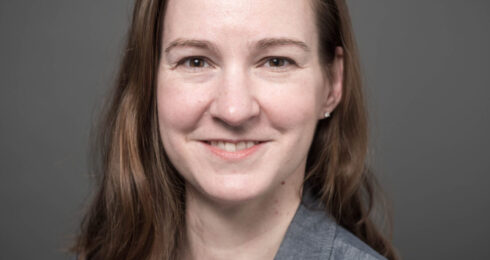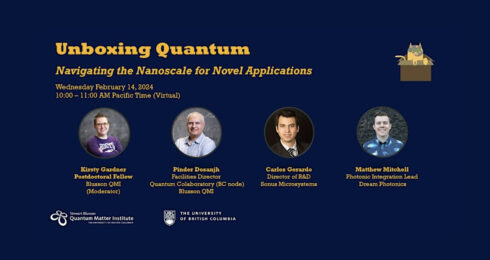Researchers from the Stewart Blusson Quantum Matter Institute (Blusson QMI) and Norman B. Keevil Institute of Mining Engineering (NBK) have been awarded $520,000 in funding to develop new sensors for mining applications through the Canada Foundation for Innovation’s (CFI) John R. Evans Leaders Fund (JELF). The CFI-JELF awards were announced this week as part of the Government of Canada’s investment of $960 million in research.

Image: Dr. David Jones, Blusson QMI Investigator and Professor at UBC’s Department of Physics & Astronomy (left); Dr. Bern Klein, Professor at UBC’s Norman B. Keevil Institute of Mining Engineering (right).
The new sensors will intrinsically improve the present mining processes by providing tangible benefits to mining productivity, resource utilization, and environmental management, supporting the industry’s transition to a green economy.
“The mining industry is urgently seeking new ways to improve current practices, as well as environmental, societal, and economic outcomes. Sensing technologies integrated into mined-materials exploration and material handling equipment represent an immediate opportunity to achieve these goals,” said Blusson QMI Investigator Dr. David Jones, who is collaborating on the project with Dr. Bern Klein from NBK at UBC.
“The sensing technology we are working on will have an unprecedented ability to precisely identify and classify critical minerals and metals as well as evaluate existing waste rock piles for overlooked opportunities,” Dr. Jones said.
The infrastructure project will support the development of two types of advanced laser ablation spectroscopy (LAS) capabilities: (1) laser-induced breakdown spectroscopy (LIBS) and (2) laser-ablation dual frequency comb spectroscopy (LA-DCS).
“Canada ranks among the top five countries in the global production of 15 minerals and metals, many integral for a greener future. With its commitment to sustainable development and as a global mineral resources leader, Canada is well-positioned to drive innovation in this sector,” said Dr. Klein.
“Recent advances in sensing technologies have allowed sensors to be mounted on excavation shovels, haul-age trucks and conveyors so that materials can be diverted for improved distribution to the processing plant or waste piles.
“We aim to advance and develop new sensing technologies that could measure the mass concentration of multiple elements of mined material in real-time with the ability to classify rock more efficiently.”
The research program brings together academic and industrial partners with expertise in mineral and materials science, laser engineering, quantum photonics, nonlinear optics and integrated photonics, quantum metrology and quantum information theory, and precision spectroscopy.
Under the supervision of Jones and Klein, the project will offer a unique opportunity for transdisciplinary and hands-on training to a diverse group of graduate students and postdoctoral research fellows. The effort also links to an emerging collaboration with other universities in Canada and the United States.
The CFI invests in research infrastructure at Canadian universities, colleges, research hospitals and non-profit research institutions, equipping researchers with the tools they need to be global leaders. Its JELF program helps institutions attract and retain researchers and provides support for the Canada Research Chairs Program.
Minister of Innovation, Science and Industry the Hon. François-Philippe Champagne congratulated the recipients from across Canada.
“Through this funding, the Government of Canada is investing in the next generation of researchers and inspiring them to continue to think outside the box and tackle the challenges of today and tomorrow,” said Minister Champagne.
Banner image: Shutterstock, conveyor belt with gold ore rocks.
Media contact: Shahrzad (Zad) Abbasi | 604 360 6761 | shahrzad.abbasi@ubc.ca


